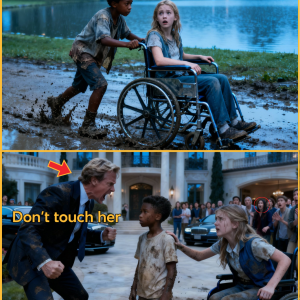
The accident happened on a Thursday—I remember because it was pizza night.
We had just pulled into the driveway when the phone rang. I turned to Micah, my son, and told him the news: Zayden’s parents had been ki-lled in a car crash. No warning. Just… gone.
Micah stood frozen on the porch.
As night fell, he finally whispered, “Where will Zayden go?”
That was the first time I saw my child cry in a way that truly broke me—his whole body shaking, breath stolen by grief.
We visited the hospital the next day.
Zayden sat alone in a chair, clinging to an old teddy bear, eyes blank. When Micah saw him, he ran straight to him and held on tightly.
“He can live with us,” Micah insisted. “I’ll take care of him.”

But the system doesn’t work that way. The caseworker was kind, but firm—Zayden would be placed with a temporary foster family while arrangements were made.
Micah was devastated. He cried himself to sleep for weeks. He didn’t know we were working behind the scenes—doing paperwork, attending interviews, training, all while hoping for the best and preparing for the worst.
Then, a few months later, we called Micah outside.
He dragged his feet, annoyed. “What is it?”
We pointed to the driveway.
There stood Zayden—same teddy bear in hand, shoes worn, backpack too big. But when he saw Micah, his face lit up.
He ran.
They met in the middle, clinging to each other like nothing else existed.
“Are you staying?” Micah asked.
“Permanently,” I said, barely holding it together.

The house erupted in joy and questions. That night, the boys fell asleep side by side, teddy bear between them. I watched from the doorway, heart full. Something that had been broken felt whole again.
At first, things were wonderful. They were like twins. Mornings were easier, weekends livelier. Laughter returned.
But cracks began to show.
Zayden had nightmares—screaming ones. He hated loud noises. Refused car rides. Sometimes we’d find him curled up in closets, rocking.
Micah never left his side. At school, he defended Zayden. At home, he became his shadow, his safety net. Beautiful—but heavy.
One night, I pulled Micah aside. “You know it’s okay to just be a kid, right?”
He looked down. “I made a promise.”
“To who?”
“To God. In the hospital. I said if Zayden came home, I’d protect him forever.”
My heart hurt. That kind of love was deep—but no child should carry that weight.
That weekend, we started therapy. The boys complained. Said the therapist smelled like raisins. But over time, things shifted.
Zayden talked—about the accident, the helplessness. Micah shared too. He missed the simpler times. Feared messing up and losing Zayden again.
There were tears. For all of us. But healing came—in quiet ways. Zayden started sleeping better. Micah went to a sleepover.
Then came the unexpected.

Eight months in, we got a call. A woman from Missouri—Zayden’s aunt. Estranged from the family, but she had found out and wanted to meet him.
She was real. Passed all checks. Had a good home. She was family.
Micah overheard. “Is she taking him?”
I didn’t know how to answer. Legally, she could.
We sat Zayden down. “Do I have to go?” he asked, trembling.
“No,” I said. “But meeting her could be good.”
Her name was Helena. She brought photos, memories, kindness. She didn’t push. She just said, “I didn’t know about you. But I’m so glad I do now.”
Zayden listened. He didn’t hide. He even asked to see her again.
Visits followed. He warmed up. But Micah grew quiet.
One night, he said, “If she takes him, I won’t have a best friend.”
“Nothing can undo what you share,” I said. “And sometimes love means letting others love too.”
He nodded, eyes brimming.
A few months later, Zayden decided: He would stay with us—but visit Helena during breaks.

It worked. Helena became family too. She came to games, helped with costumes, sent silly cards.
Years passed. Nightmares stopped. The closet stayed empty.
Then one day, Zayden gave Micah his teddy bear.
“Why?” Micah asked.
“Because I’m okay now,” Zayden said. “You carried me when I couldn’t carry myself. Now it’s okay to let go.”
Micah cried again—this time, the healing kind.
They’re teenagers now. Taller than me. Still finishing each other’s sentences. Still laughing—but now with ease, without the weight of the past.
Just the memory.
The reminder that sometimes, the love we give—especially when we’re young—is what saves someone else. And sometimes, a 9-year-old can keep a promise that changes a life.



